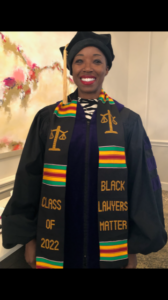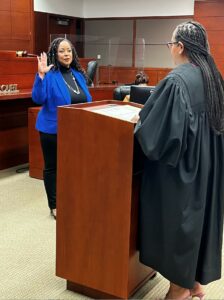Despite efforts to diversify the legal profession, there is much work left to do.
The results of the State Bar of California’s report on Diversity of 2022 California Licensed Attorneys were stark but not surprising. The survey showed that white people made up 39% of California, but two-thirds of the almost 200,000 licensed attorneys in the state are white. Conversely, Latinos make up 36% of the state’s population but only 6% of its attorneys..
Since its founding in 1969, The Colleges of Law has made inroads toward diversity. “Our college was started specifically to serve working adults,” says Dean Jackie Gardina, J.D. “The evening hours made it possible for working women or women who were primary caretakers of children to attend law school. Now those women are in positions of power. They’re judges; they’re elected officials.”
With the creation of the first hybrid J.D. program in California, The Colleges of Law further broke down geographic barriers to attendance. Within California, the African American population is 6%, but within the Hybrid J.D. program, it’s 12%. Dean Andrea Funk says, “I have been in legal education for 26 years and have never seen the kind of diversity that we have in the Hybrid J.D. program.”
The Colleges of Law’s efforts to enroll women of color align with efforts by the State Bar of California to diversify the legal profession. Expanding the geographic boundaries of access and affordability to a broader range of people allows African American women from across California to access legal education more easily. And these efforts have gained statewide recognition, as the college has been selected as a DEI Leadership Seal Silver tier recipient in the first cohort of the state bar’s DEI Leadership Seal program for its efforts to advance diversity, equity, and inclusion in the workplace and in the legal profession.

A common theme among current students and recent graduates of the Hybrid J.D. program who are women of color is that many came from the professional realm after deciding to pursue law degrees to enhance what they were already doing professionally.
Why the law as a profession?
When she was 4 years old, Nicole Wilson told her father that she wanted to be an attorney “to help people,” even though she didn’t know what an attorney does. In high school, Wilson was on the speech and debate team and the mock trial team, and she took classes toward a legal certificate. She planned to go to law schooI and even worked a series of jobs in law-related fields, but it wasn’t until she was pursuing a master’s degree in educational leadership and policy studies that she realized she could marry her love of higher education with her love of the law by augmenting her professional training and experience.

Erica Lemon, J.D., was well established in her professional career. Based in Dallas, Texas, she works with Veterans Administration and Department of Defense hospitals in 16 states. Following the murder of George Floyd by Minneapolis police and the subsequent protests and calls for justice, she felt compelled to do more and looked to the legal field as an effective area to make an impact. However, her work required her to travel four days a week, making a commitment to an in-person law school difficult.
Janine Mitchell, J.D., intended to pursue a career in broadcast journalism until she took a criminal justice class in college and fell in love with the law. She wanted to go to law school but had her first daughter during her sophomore year. Mitchell became a paralegal instead. She still intended to go to law school, but most of the programs were not designed for students who work full-time and are single parents.
Why a hybrid J.D.?
Being able to study during the week at her own pace and then travel to Ventura once a month to have the in-class experience and in-person access to teachers and fellow students worked well for Wilson. “The program has far exceeded my expectations,” she says.
Even during the COVID-19 pandemic, when in-person residencies ceased and courses were held via Zoom, Wilson, as a young mother, appreciated the ease of working from home. “The benefit of a hybrid program is that you are able to do your work throughout the week at your own pace. Additionally, you have access to your professors online, while also having a classroom experience, once a month. Having multiple ways of access is important,” she says.
When Lemon learned The Colleges of Law Hybrid J.D. program combined remote course work with visits to the Ventura campus four weekends per term, she saw an opportunity. “I travel to California frequently for work,” Lemon said, “so getting there wasn’t hard.”

Because of COVID-19, she was unable to travel to The Colleges of Law during her first years of the program, but when she did, she found a diverse population. In addition to the significant presence of Latino students, Lemon says she remembers about 10 Black students. “It sure was a lot different from the pictures on the wall,” she said of the portraits that adorn the hallways of professors and presidents of the college in previous generations.
For Mitchell, the goal was to find a program that would allow her to raise her daughter and continue to work full-time. “I stumbled upon The Colleges of Law Hybrid program,” she says. “It really impressed me that they considered nontraditional students in creating the program. I applied for the program and was fortunately accepted.”
Challenges for women of color
To counter the discrimination that women of color experience, Wilson is proactive about identifying mentors. “If there are a lot of closed doors that you’re encountering, all you need is one open door,” she says. “I’ve been able to find people that advocate for me and that have been able to mentor me, whether it’s my workplace or at The Colleges of Law,”
As her knowledge of the law expanded through her studies, Lemon learned that that injustice toward people of color extends beyond policing and the criminal justice system. “There are also issues surrounding property, the lack of estate planning and wills,” she says.
Mitchell says she still gets comments like, “Oh, are you the paralegal? Are you the assistant?” She spent three weeks at a trial in San Bernardino County and didn’t see a lot of people who looked like her. “There is pressure to exceed expectations for myself just to show I belong here,” she says.
She currently works at a law firm founded primarily by African American attorneys, some of whom later became judges. “There are people that look like me in this field, and there’s this program that’s accessible for me as a non-traditional student,” Mitchell says. “Both of those two factors played into my decision to choose The Colleges of Law.”
Opportunities for those who are entering the field
“I’ve been fortunate at the firm that I’m with,” Mitchell says. “I had worked for them as a paralegal in the past. Less than two months into my practice, I tried a case. We practice elder abuse and neglect cases, and not many firms do that on the plaintiff’s side. It’s a very specialized area of law. I see myself really just growing here, continuing to try cases, and becoming just a great trial attorney.”

Wilson is interested in pursuing educational law and corporate law after she graduates. In the meantime, she wishes to pay forward the benefits she’s received from those who have helped her. “I’m passionate about student success, ” she says, “so I am going to be a mentor starting in the fall for incoming 1Ls.”
Advice for aspiring lawyers
“My advice would be to just get involved in any way you can,” Mitchell says. “Put yourself out there. Don’t feel that just because not a lot of people look like you and your surroundings that you kind of have to keep to yourself. Become involved in as many activities as you can, push yourself as far as trying to get internships, externships, and networking. Put yourself out there and know that you’re good enough, you belong here.”
While she was attending The Colleges of Law, Lemon was among those pressing the faculty and administration to better support students in preparing for the bar exam. Many of their recommendations were adopted. Lemon says preparing for the bar exam is key, and she urges students to take advantage of the bar exam prep app AdaptiBar, visit BarEssays.com to review essays written for past bar exams, and take as many practice tests as possible.
Wilson stresses the importance of mentors. “If you have an area of law that you’re interested in, find someone who can mentor you. In my experience, attorneys are looking for someone to mentor,” she says. “If you’re not sure what area of law you are interested in, do an internship, volunteer, expose yourself to different types of law, so you can figure out what area you’re interested in practicing. Find someone that you can emulate and that can walk beside you in the journey, because you will face obstacles. You will face barriers, but that doesn’t have to stop you.”

